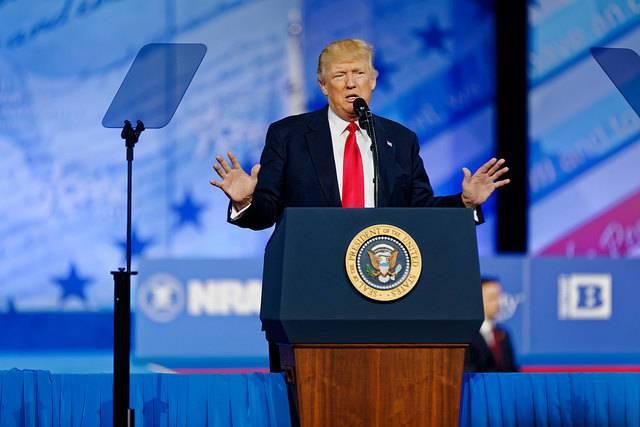
U.S. President Donald Trump’s proposed budget for fiscal year 2018 is out, and it is every bit as devastating to federal agencies as anticipated. It calls for a $54 billion increase in defense spending in 2018 that will be “offset by targeted reductions elsewhere.” The departments of Defense and Homeland Security will receive funding increases, while every other agency faces massive cuts.
Independent agencies supporting the arts, development groups and public broadcasting would be eliminated. The list includes the Corporation for Public Broadcasting (CBP), which funds PBS and public radio stations through grants. In 2014, the CPB gave $74.63 million for television programming which included popular shows like "Frontline" and "NewsHour," according to the Poynter Institute.
The CPB also funds journalism and has invested over $27 million since 2009 to help launch 113 public media stations in 40 states.
“There is no viable substitute for federal funding that ensures Americans have universal access to public media’s educational and informational programming and services,” Patricia Harrison, president and CEO of the CPB, said in a statement.Earlier this week, Damian Paletta of the Washington Post warned that a budget like this may end up causing a “historic contraction of the federal workforce.” And that could mean federal agencies will not be able to do all that they are tasked with doing, causing them to cut programs. Impacted agencies include NASA and the National Oceanic and Atmospheric Administration (NOAA).Eliminating federal funding to the CPB “would initially devastate and ultimately destroy public media’s role in early childhood education, public safety, connecting citizens to our history, and promoting civil discussions,” she added.
Some Florida scientists are so concerned about the proposed budget cuts that they wrote a letter to Trump and asked him to reconsider.
In the open letter, they reminded the president that “American scientists have historically been at the forefront of scientific discoveries and innovation.” As a result, the nation needs to “invest heavily in our effort to understand our home planet and be aware of how physical changes will impact industry and society.” They say both NASA and NOAA support such research and are “crucial to our ability to predict extreme weather.”
The scientists also claim these agencies help create jobs and have a “huge impact on our economy, and ultimately generate the technologies that make America great.”
Earth science programs support diverse research, including monitoring and analzing soil changes and water resources, and tracking conditions that affect the food and medicines obtained from the ocean. All of these activities are vital to the American economy.
The scientists encouraged Trump to do the following as he considers spending allocations:
- Continue earth science research, including funding for NOAA’s environmental satellites and NASA’s new technologies that measure the vital signs of the planet.
- Preserve scientific integrity by not allowing politics to interfere with the information shared with the public.
- Recognize coastal properties that are at risk from rising sea level.
A coalition from the coal industry, energy associations and labor unions is also speaking out about the proposed budget.
In another open letter, they asked Trump to preserve funding for the Department of Energy’s (DOE) Office of Fossil Energy, which studies technologies such as carbon capture and storage.
They cited a public-private partnership as an example of the department's success: The Petro Nova project at a coal-fired power plant in Texas will be the largest carbon capture initiative in the world. Rather than being emitted into the atmosphere, the captured carbon is used in nearby oil fields, helping to produce 75 million barrels of oil. “Thanks to smart federal and private investments, the project is on time and on budget,” the letter states.
Democratic lawmakers are unsurprisingly also displeased with the budget. And some Republican lawmakers expressed their concern before it was even released. Sen. Lindsey Graham (R-S.C.) said the president’s budget “is dead on arrival” and “would be a disaster.” Back in January, Sen. Lamar Alexander (R-Tenn.), senior member of the Appropriations Committee and chairman of the Health, Education, Labor and Pensions Committee, said: “Any effort to balance the budget by cutting discretionary spending is not a straightforward approach.”
Now that the proposed budget has been released, even more lawmakers are speaking out. Some Republicans took issue with cuts to programs that benefit their constituents. Speaking about cuts to a program that benefits the Great Lakes, Sen. Rob Portman (R-Ohio) said: “I’m committed to continuing to do everything I can to protect and preserve Lake Erie, including preserving this critical program and its funding.”
Rep. Charlie Dent (R-Penn.), who also sits on the Appropriations Committee, added: “We can’t finance a defense buildup entirely on the back of domestic, non-defense spending. It’s not realistic and unfair.” He explained that while the president proposes a budget, the Congress disposes it. In other words, Congress controls the purse strings.
The initial congressional reaction may just be a sign of what’s to come. Or as Lisa Mascaro of the Los Angeles Times put it: “The reaction illustrated why, despite the significant attention they are drawing, Trump's proposed dramatic cuts will likely be scaled back, changed or eliminated altogether.”
Image credit: Flickr/Michael Vadon

Gina-Marie is a freelance writer and journalist armed with a degree in journalism, and a passion for social justice, including the environment and sustainability. She writes for various websites, and has made the 75+ Environmentalists to Follow list by Mashable.com.














